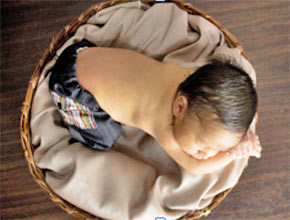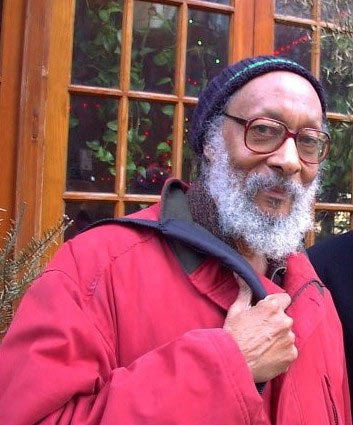September 4, 2019 issue
Authors' & Writers' Corner

Kamil Ali
A baby’s wails pulled a politician’s wife out of sleep. Trying not to wake her husband, Irma Salton tiptoed out of the room to investigate. She opened her front door and gasped at the sight of a sleeping baby in a basket. The newborn’s half-naked body prompted her to pull him indoors from the midnight chill. She covered him with a throw from a nearby sofa and took him into the room to rouse her husband.
Her husband entered the bedroom next door, which they had converted to a home office, and sat behind his desk. Irma entered and closed the door. She pulled up a chair beside him while she kept an ear on the adjoining wall to monitor the baby’s sounds.
The computer screen on the desk showed twelve frames of images from cameras placed at various locations around the estate on which their mansion stood. One showed the security guard reading a book in his hut inside the sizeable wrought iron front gates, which was the only entrance to the property. He reversed the images to earlier periods to track the baby’s arrival at his front door. None of the cameras showed anything out of place except the one aimed at the front door, which showed the magical appearance of the basket.

Germaine promised to make a few phone calls the next day. He’d have to use his political influence to make his wife’s most desired wish of having a child come true. Germaine had given her everything to make her happy but had failed to satisfy her most cherished desire. He did not believe Irma’s claim of a miracle. The cameras had not captured how the baby arrived at the doorstep. Germaine convinced himself that someone must have gone to great lengths to remain anonymous. They had eluded the security guard and the cameras to place their unwanted baby at his residence, knowing that his upper-middle-class lifestyle and political connections would benefit their child instead of raising him in a life of poverty.
When they returned to their bedroom, they lifted the baby out of the basket to search for any notes. They found none. With the child displaying no signs of discomfort from hunger, they placed him between them to continue his slumber. Irma stared at the baby all night. She kissed him several times and smoothed his hair with tears of joy streaming out of her eyes. Germaine awoke a few times and smiled at the childlike bliss the baby gave his wife. His heart melted at the bonding between mother and God-gifted baby.
The next morning, instead of reporting the incident to the authorities or using DNA to track the baby’s birth parents, he had a fake birth certificate and adoption papers secretly made by a top-level government official, that showed the baby’s age as a few days old. They name the baby Germaine Salton Jr.
A week later, the Saltons advertised in an out of country newspaper for a live-in nanny to help Irma raise Junior while they traveled together on official government business for days at a time.
The first nanny they interviewed by phone pleased them. They bought a plane ticket for her to attend a personal interview with references. They loved Diedre’s foreign accent and her interactions with Junior, who showed much delight to be in her company. The instant connection won their hearts. They hired her on the spot without any thoughts of checking her references.
Junior excelled in Diedre’s homeschooling. By the age of two, he showed superior intelligence. Germaine introduced Junior to his colleagues with proud Irma by their sides. Junior fit right in with the political circles and partook in mature discussions, which impressed all present, but his relationship with Diedre troubled his adopted mother. He had reversed their roles by treating Diedre with the respect of a mother and placing Irma in the role of a nanny.
On his twenty-first birthday, Junior stood by his mom’s side to give the eulogy at his adopted father’s funeral. Germaine had died in an unfortunate accident when a hit-and-run driver ran into him and a few of his colleagues. The driver sped away and was never identified.
Junior vowed to step into his father’s shoes to become a second-generation politician. Sympathy from the constituency catapulted him into the senate.
One day while Irma cleaned Germaine’s room to make it ready for Junior to use, she discovered research that Germaine had done on both Junior and Diedre. He had secretly had their DNA tested and found them to be non-humans with matching DNA strands. He suspected that Junior was the devil’s spawn, brought into the world by the womb of Diedre to gain supremacy in the senate and eventually become president of the most powerful nation on Earth. Germaine had made a decision to seek advice from his closest colleagues. He had asked them out to lunch when they were plowed down on the street before he had a chance to tell them of his suspicions.
According to Germaine’s notes, the pastor at the church had told him that Irma had invited Satan’s child into their home when she brought him in. They had asked the child’s mother to live with them.
The next day’s headlines broke the tragic news of the explosion from a natural gas leak that killed Irma. Luckily, Junior and Diedre had been out shopping on her Saturday day off.

By Romeo Kaseram
Kamau Brathwaite, originally Lawson Edward Brathwaite, was born on May 11, 1930 to father, Hilton Edward, and Beryl (neé Gill) Brathwaite in Bridgetown, Barbados. Following his early primary school years, he started secondary education in 1945 at Harrison College in Bridgetown. Four years later, in 1949, Brathwaite received a Barbados Island Scholarship that took him to Cambridge University in England. Here he studied English and History, convocating in 1953 with an honours BA in History from Pembroke College. At the same time, Brathwaite was associated with the BBC’s Caribbean Voices programme in London; in 1954 he received a Diploma of Education, again from Pembroke College. In 1968 he received his doctorate from Sussex.
According to Wikipedia, in 1955 Brathwaite began working as an Education Officer on the Gold Coast, now Ghana, with its Ministry of Education. Here his writing began flourishing, with the play, Odale’s Choice premiering at Mfantsiman Secondary School; a full production was done later in Ghana’s largest city, Accra. Brathwaite returned to the Caribbean in 1962, becoming a Resident Tutor in the Department of Extra-Mural Studies in St Lucia. In 1963, he began teaching in the History Department at the University of the West Indies, Mona Campus in Kingston, Jamaica. Three years later, he was a co-founder and secretary of the Caribbean Artists Movement from London.
Brathwaite launched Savacou, a journal of CAM, at UWI’s Mona Campus in 1971. This was also a significant year for him – it was when he received the name Kamau, given by the grandmother of the African writer, Ngugi wa Thiong’o, at Limuru, Kenya. At the time he was on a City of Nairobi Fellowship at the University of Nairobi.
Wikipedia tells us Brathwaite’s doctoral thesis from Sussex University, researched and written on The Development of Creole Society in Jamaica was published in 1971 by Oxford University Press. In 1973, he published what is generally considered his best work, The Arrivants: A New World Trilogy, a text comprising three earlier volumes, Rights of Passage (1967), Masks (1968), and Islands (1969). In 1968, his wife, Doris Monica Brathwaite, produced an exhaustive bibliography of his work, EKB: His Published Prose & Poetry, 1948-1986. According to Wikipedia, in response to his wife’s death in late 1986, Brathwaite wrote The Zea Mexican Diary: 7 September 1926-7 September 1986.
The Poetry Foundation tells us Brathwaite uses “nation language”, along with “linguistic and typographic innovation” for poetic compositions that “deftly parse the connected strands of postcolonial, historical, and personal inquiry”. The Foundation also notes, as Publishers Weekly indicated in its review of Brathwaite’s Born to Slow Horses (2005), that his work is “omnivorously synthetic, insistently local, sinuously syncopated and consistently exciting”. Encyclopedia.com further explores Brathwaite’s oeuvre, noting that his early poetry – Rights of Passage, Masks, and Islands – had established him as a major talent, adding: “This autobiographical trilogy… reflects the poet’s contact with white cultures and Africa and explores the shaping of racial identities.”
Additionally, Encyclopedia.com tells us Brathwaite’s later work, such as Other Exiles (1975), Sun Poem (1982), X/Self (1987), Middle Passages (1992), Trenchtown Rock (1993), Words Need Love Too (2000), and Ancestors (2001) “…highlights global concerns from a remarkable array of African, European, and Caribbean perspectives”, and that his “poetry is characterised by a deft interweaving of voices, innovative fonts, and vivid renderings of black speech and music, particularly jazz”. According to Wikipedia, Brathwaite often uses a combination of customised typefaces, some of which are similar to dot matrix printing, and spelling, which is referred to as Sycorax video style.
Brathwaite was the International Winner of the Griffin Poetry Prize in 2006 for his Born to Slow Horses. The Judges’ Citation said of his work, “To read Kamau Brathwaite is to enter into an entire world of human histories and natural histories, beautiful landscapes and their destruction, children’s street songs, high lyricism, court documents, personal letters, literary criticism, sacred rites, eroticism and violence, the dead and the undead, confession and reportage. An epic of one man (containing multitudes) in the African diaspora, Brathwaite’s world even has its own orthography and typography, demanding total attention to the poem, forbidding casual glances.”
It added: “Born to Slow Horses is a major book from a major poet. Here political realities turn into musical complexities, voices overlap, history becomes mythology, spirits appear in photographs. And, in it what may well be the first enduring poem on the disaster of 9/11, Manhattan becomes another island in the poet’s personal archipelago, as the sounds of Coleman Hawkins transform into the words and witnesses and survivors. Throughout Born to Slow Horses, as in his earlier books, Brathwaite has invented a new linguistic music for subject matter that is all his own.”
Brathwaite is also well-known for his studies of Black cultural life both in Africa and throughout the African diasporas of the world, Wikipedia tells us. This is notable in works as Folk Culture of the Slaves in Jamaica (1970); The Development of Creole Society in Jamaica, 1770-1820 (1971); Contradictory Omens (1974); and Afternoon of the Status Crow (1982). His publication, History of the Voice (1984), established him as the authority of note on nation language.
He served on the board of directors of UNESCO’s History of Mankind project from 1979, and he was cultural advisor to the government of Barbados from 1975-1979, and 1990. He also received numerous awards, including the Neustadt International Prize for Literature, edging out nominees Toni Morrison, Norman Mailer, and Chinua Achebe. He also won the Bussa Award, the Casa de las Américas Prize, and the Charity Randall Prize for Performance and Written Poetry from the International Poetry Forum.
He was the sole recipient in 2006 of Jamaica’s Musgrave gold medal, awarded by the Institute of Jamaica, which sadly he reported was stolen from his New York apartment in March 2010. He received fellowships from the Guggenheim, Ford, and Fulbright Foundations. Brathwaite taught at Harvard University, the University of the West Indies, and New York University. In 2015 he received the Poetry Society of America’s Frost Medal, for a distinguished lifetime achievement in poetry – previous winners included Wallace Stevens, Marianne Moore, Gwendolyn Brooks, and Allen Ginsberg. Last year, Brathwaite was a PEN/Voelcker Award for Poetry recipient, the award given for his “unwavering ability to illustrate utmost beauty and deepest pain, and his unique and meditative body of work”. He is Professor Emeritus of Comparative Literature at New York University, and currently resides in Cow Pasture, Barbados.
Sources for this exploration: Wikipedia, Encyclopedia.com, Britannica, The Poetry Foundation, and The Griffin Poetry Prize.